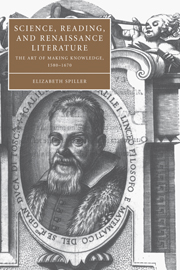Crossref Citations
This Book has been
cited by the following publications. This list is generated based on data provided by Crossref.
Weldon, Stephen P.
2005.
Current Bibliography of the History of Science and Its Cultural Influences 2005.
Isis,
Vol. 96,
Issue. ,
p.
1.
Park, Katharine
2006.
Women, Gender, and Utopia.
Isis,
Vol. 97,
Issue. 3,
p.
487.
Marchitello, Howard
2006.
Science Studies and English Renaissance Literature.
Literature Compass,
Vol. 3,
Issue. 3,
p.
341.
Preston, Claire
2006.
Of Cyder and Sallets: The Hortulan Saints and The Garden of Cyrus.
Literature Compass,
Vol. 3,
Issue. 4,
p.
867.
2008.
Punctuation.
p.
108.
2008.
Punctuation.
p.
85.
Shanahan, John
2008.
Ben Jonson'sAlchemistand early Modern Laboratory Space.
Journal for Early Modern Cultural Studies,
Vol. 8,
Issue. 1,
p.
35.
2008.
Punctuation.
p.
134.
2008.
Punctuation.
p.
169.
2008.
Punctuation.
p.
62.
2008.
Punctuation.
p.
191.
2008.
Punctuation.
p.
27.
Fox, Cora
2009.
Ovid and the Politics of Emotion in Elizabethan England.
p.
125.
Rothman, Aviva
2009.
Forms of Persuasion: Kepler, Galileo, and the Dissemination of Copernicanism.
Journal for the History of Astronomy,
Vol. 40,
Issue. 4,
p.
403.
Malcolmson, Cristina
2011.
The History of British Women’s Writing, 1610–1690.
p.
238.
2011.
Supernatural Environments in Shakespeare's England.
p.
224.
Zwierlein, Anne-Julia
2011.
The Literature of Melancholia.
p.
35.
Clairhout, Isabelle
and
Jung, Sandro
2011.
Cavendish's Body of Knowledge.
English Studies,
Vol. 92,
Issue. 7,
p.
729.
Wallace, Joseph
2013.
Wandering Eyes: Jonson’s Catiline and the Problem of Sight.
Renaissance Drama,
Vol. 41,
Issue. 12,
p.
85.
O’ROURKE BOYLE, MARJORIE
2013.
Harvey, by Hercules! The Hero of the Blood’s Circulation.
Medical History,
Vol. 57,
Issue. 1,
p.
6.





